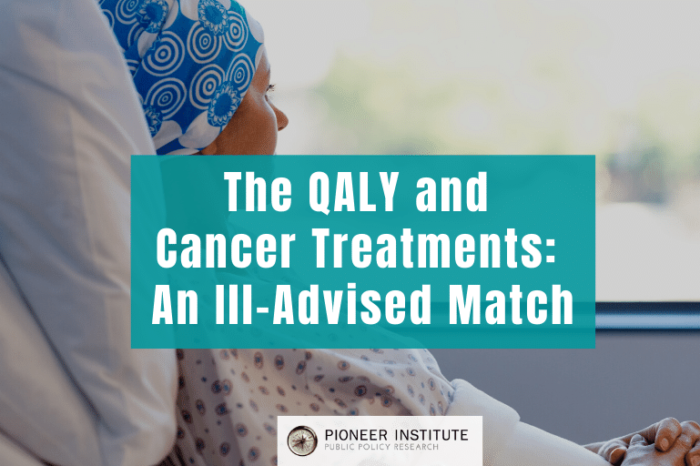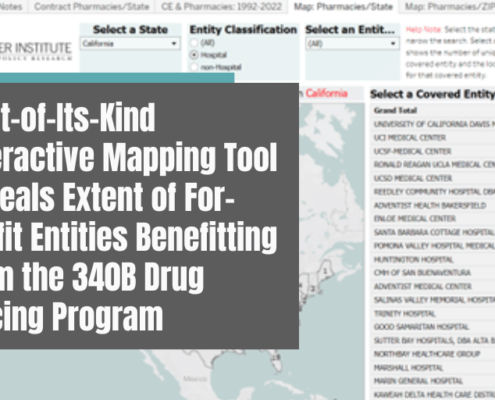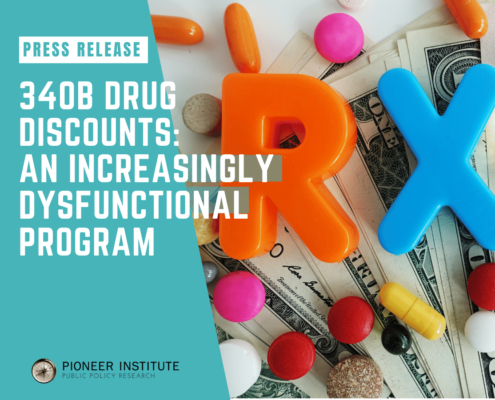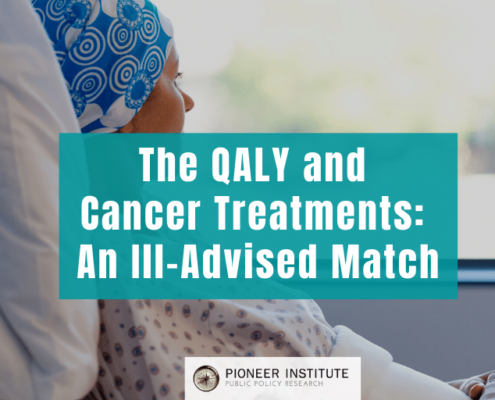New Analysis: ICER Framework Ignores Patient Preferences, Innovation & Societal Benefits in Evaluating Cost-Effectiveness of New Cancer Treatments
Policymakers Should Ban the Use of the Quality Adjusted Life Years (QALY) Methodology in Evaluating New Cancer Therapies & Prohibit ICER from Advising Government Agencies
Media inquiries: Contact Micaela Dawson, mdawson @pioneerinstitute .org
Boston – Pioneer Institute today released a new analysis, The QALY and Cancer Treatments: An Ill-Advised Match, that examines the alarming methodological and contextual shortcomings of the Quality Adjusted Life Years (QALY)-based methodology in evaluating new cancer therapies. The Pioneer Institute analysis reveals five specific problems with ICER’s evaluation of cancer treatments and demonstrates the urgent need to prohibit the use of the QALY amid trends in rapid cancer innovations and personalized medicine.
Author and Pioneer Institute Visiting Fellow in Life Sciences Dr. William Smith concluded that policymakers should ban the use of the QALY in evaluating cancer treatments, especially during a period of great progress for cancer care and in light of the challenges many have faced in accessing necessary cancer screenings and treatments during the COVID-19 pandemic.
“The mission of ICER is not to conduct “objective” evaluations of treatments that could offer help and hope to very sick people,” wrote Dr. Smith. “Rather, it seeks to limit patient access to expensive new treatments and reduce drug costs for payers. Given its unwillingness to accept reforms that are advocated by patients, as well as the inadequacy of the QALY in evaluating the cost effectiveness of cancer therapies, policymakers should not waste time trying to convince ICER to modify their framework methodology. Instead, policymakers would be wise to adopt the David Cameron strategy of banning use of the QALY altogether in evaluating cancer treatments and prohibiting ICER from advising U.S. government agencies regarding their formulary design.”
The Pioneer Institute analysis examines five problems with the QALY in evaluating new cancer treatments, including:
- The QALY Ignores the Societal Benefits of Effective Cancer Therapies. One would expect that any therapy that lifted the tremendous burden on caregivers should be assessed a higher value. Yet, ICER does not value obvious “indirect” benefits in their value assessments.
- Oncology Clinical Trials are Not Representative of the Patient Population Who Will Use the Medicine. The QALY is ill-suited to evaluate cancer therapies with clinical trial data alone. ICER is conducting cost-effectiveness reviews using clinical trial data that is more than 50 percent different than the patient population that will actually be using the medicine.
- The QALY Ignores Patient Preferences. Surveys of the general public do not adequately capture the high values that actual cancer patients tend to place on incremental improvements.
- The QALY Ignores the Shift to Personalized Medicine. If you exclude personalized medicine from your value framework – as ICER does – you end up excluding access to therapies for certain patients who, because of their genetic profile, may respond exceptionally well to a certain therapy.
- The QALY Represents a Poor Measure of Progress Against Cancer. Given that progress against cancer is measured in months, not years, the QALY tends to rate cancer advances poorly because those advances, while clinically meaningful, do not extend longevity enough to achieve a high cost-effectiveness rating.
“ICER was originally formed by the health insurance industry with one goal in mind: lower its drug costs to increase its profits,” added Dr. Smith. “All its cost effectiveness reviews need to be understood in this light.”
In the analysis, Dr. Smith examined how similar cost-effectiveness policy degraded the quality of cancer care in Great Britain. In the U.S. between 2016 and 2019, just four of the 11 cancer drugs that ICER reviewed were rated as cost-effective.
Read the full analysis here: The QALY and Cancer Treatments: An Ill-Advised Match
About the Author
William S. Smith is Visiting Fellow in Life Sciences at Pioneer Institute. He has 25 years of experience in government and in corporate roles, including as vice president of public affairs and policy at Pfizer, and as a consultant to major pharmaceutical, biotechnology and medical device companies. He held senior staff positions for the Republican House leadership on Capitol Hill, the White House, and in the Massachusetts Governor’s office. He is affiliated as research fellow and managing director with the Center for the Study of Statesmanship at The Catholic University of America (CUA), where he earned his PhD.
Pioneer’s mission is to develop and communicate dynamic ideas that advance prosperity and a vibrant civic life in Massachusetts and beyond.
Pioneer’s vision of success is a state and nation where our people can prosper and our society thrive because we enjoy world-class options in education, healthcare, transportation and economic opportunity, and where our government is limited, accountable and transparent.
Pioneer values an America where our citizenry is well-educated and willing to test our beliefs based on facts and the free exchange of ideas, and committed to liberty, personal responsibility, and free enterprise.
Get Updates On Our Life Sciences Work!
Related Content:











